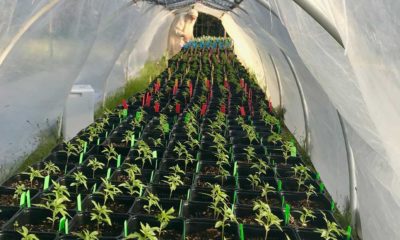
Culture
OG Outlaws Come Into View
While cannabis legalization has inevitably changed our culture and way of doing business, Nikki Lastreto of the Emerald Triangle reflects on what’s needed to survive and how large corporations and small OG farmers can learn to work together to build a brighter future for all.
It’s a classic scene. Imagine it’s 1979, and you’re somewhere in the heart of the Emerald Triangle in far Northern California. You cruise into the local grocery store parking lot, and there’s your neighbor and old friend, who you know darn well is also an underground marijuana grower. While you may be the only long-haired freaks in the lot, there are plenty of redneck lumber types around who simply don’t like them “damn hippies” moving into the area. Discretion is the name of the game.
“Hey man,” you might say in a casual manner, and then under your breath, whisper something like, “How’re girls doing? Do you have tons of grasshoppers this year too?” Short and sweet and natural. Just being neighborly, in an outlaw neighbor sort of way.
Longer encounters occurred in more discreet locations. Like specific turnouts on windy country dirt roads, places with names like Piss Corner and The Hideaway. Or at some of the tiny weekly summertime farmers markets in small outposts deep in the hills, where growers congregated to really hash things out and share tips and more. There were even “message trees” where people would leave notes for other illegal growers or buyers about what was available and how to connect.
“Shit, a bunch of mice ate my starts,” says one guy, and another answers with, “I’ll bring you some more tomorrow.”
Or another person may say, “I know a guy looking for some good kush, got any?” And a group will settle down to smoke a few joints of kush to check it out.

Shared Risks and Pleasures of the Underground Weed Scene
Everyone had their special buyers across the country—mostly in the Bay Area at first—so no one stepped on anyone else’s business, and all was cool. Sure, there were raids and helicopters more and more as time passed, but we learned to help each other through those situations too. At the same time that we all hid in the shadows, we came into full love and light with our fellow farmers. We shared the risk and the pleasures.
OG outlaw farmers in these rugged hills worked hard and played hard. Hauling 50-pound bags of soil up steep hillsides while trying not to leave a trail is a challenge. Digging holes, hauling water, all on scorching hot summer days… it’s exhausting. So, if someone figured out a trick to save some time and energy, we shared it. We may have all been in the same illegal boat, but we were in it together and proud of the work we were doing.

Creating a Desirable Future
Fast forward forty-four years and here we are, the few of us still hanging onto the life raft, while the boat teeters on the big waves around us. Many of us believe in the power of numbers, so we band together to create various organizations to deal with local and State politics and to create the “branding” of our individual counties.
Take Origins Council, for example. It’s comprised of six regional trade organizations with approximately 600 members across the state who are instrumental in creating appellation programs for cannabis and are politically active in Sacramento. As their mission statement declares: “Our organization is dedicated to sustainable rural economic development within cannabis-producing regions, and establishing nationally and internationally recognized, legally defensible, standards-based, geographic indication systems for cannabis.”
One of the first such regional organizations around our area was MCPC—the Mendocino County Policy Council—which we started in 2014 originally to protect farmers with quasi-legal grows who were getting busted. That morphed into the MCIA, the Mendocino Cannabis Industry Association, which focused on branding and marketing the county and the growers, as well as county politics. There was also the Mendocino Growers Association led by Casey O’Neill, which was more policy-oriented and more active on the State level. The two groups soon merged to become MCA, the Mendocino Cannabis Alliance, which exists today and is fighting valiantly for our rights.

As MCA Executive Director Michael Katz explains, “What we’ve seen here in Mendocino is that when we come together and speak with a strong voice as an informed community we are able to facilitate meaningful changes, such as the recent intervention by the State to take over Environmental Review for Annual Licensing from the County, a 50% local cannabis tax reduction for 2023 and 2024, and ordinance revisions designed to streamline processing and issuance of local licenses.”
While change doesn’t always happen as fast as they would like, Katz says harnessing community support is critical.
“It’s important to make sure that the community fully supports a consistent and sustained professional advocacy approach at both the local and State levels if we really want to impact our collective future,” he says. “As the saying goes, if you’re not at the table, you’re on the menu, and organizations like MCA and Origins Council make sure that our community is on the right side of that equation.”
Tensions Rising With Cannabis Legalization
Not all licensed growers are members of such organizations, however, as some prefer to fight their own battles and are still hesitant to come into the light. “These days, everyone is looking out for themself,” claims Tony Mendocino, an originator of the cultivar The Original Z (*previously known as Zkittlez).
It’s sad but true: A high level of competition has risen up as the few remaining brands try to survive in such tough times. There is only so much space on dispensary shelves, and some growers are literally fighting for it, and not always with honorable means. While the big corporate companies seem able to burn cash to keep going at a loss every quarter, small farmers struggle to stay in business. Tensions run high in stressful situations, and stories of violence and even suicides are told.

Learning to Lean on One Another
Everyone blames everyone else. Some could consider it a divide-and-conquer technique by the government to wipe out all the small farmers. However, Attorney Dana Cisneros, founder of the Cannabis Corporate Law Firm in Southern California, points out something else.
“I don’t think this is all intentional because I don’t think the government and all its departments actually have it together well enough to be nefarious. This is good old-fashioned incompetence,” she says. “I once heard Obama say, ‘Changing policy is like parking an oil tanker,’ and I think that’s a great thing to focus on. Because even oil tankers need tugboats to guide their way. I think it’s a great metaphor for the cannabis industry. If that tanker overruns the little tugboat, it can’t make it to the dock. Similarly, if the larger cultivators don’t honor the small farmer, the industry is worthless and the culture is gone.”
The cannabis community needs to hold together to make it through this rough patch. It may be refreshing to finally have the freedom to speak openly about our profession, but let’s do it with compassion for others. As with any business, transparency and honesty outweigh greed and selfish gain.
If the Message Tree still existed, I’d post, “We are in this together, so let’s do it right.”






















